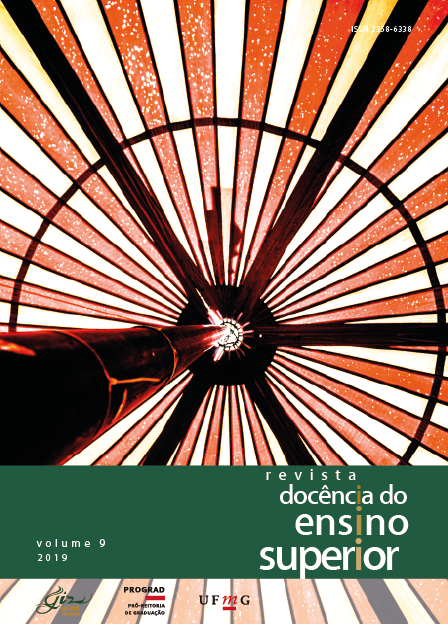Active methodologies
the evidence of continued teaching training in higher education
DOI:
https://doi.org/10.35699/2237-5864.2019.2543Keywords:
Active methodologies, Continuing education, Professors, Undergraduate studentsAbstract
This study aimed to analyze the contributions of continuing teacher education in the use of active methodologies with undergraduate students. To achieve this objective, the theoretical construct about continuing education, teaching at universities and active methodologies was referenced in Gatti, Veiga, Lucarelli, Freire, Zabalza, Cerdeiriña, Masetto, among others. The empirical construct, within the qualitative approach, was constructed through two ways of data collection: interview with four professors; and four groups with 28 undergraduates, using the assumptions of Discursive Textual Analysis and NVivo software to analyze the data. Results point the main advances in the use of active methodologies in class: many teachers/professors have used the active methodologies, students are satisfied with active methodologies classes, the classes have had more planning and organization, a better relationship between teacher and student have been established, there is active learner attitude, participation, interest, dialogue, collaborative work and learning in class. Some challenges were also highlighted: how teachers understand the way students learn, how to develop collective planning, and how to deal with inappropriate material, initial resistance of students, time required for learning and little contribution of students in the construction of classes.
Downloads
Downloads
Published
How to Cite
Issue
Section
License
Copyright (c) 2019 Robinalva Ferreira, Marília Morosini

This work is licensed under a Creative Commons Attribution 4.0 International License.
Authors who publish in this journal retain the copyright and grant the journal the right of first publication, with the work simultaneously licensed under the Creative Commons Attribution License which allows the sharing of work with acknowledgment of authorship and initial publication in this journal.
Authors are authorized to take additional contracts separately, for non-exclusive distribution of the version of the work published in this journal (e.g. publish in institutional repository or as a book chapter), with acknowledgment of authorship and initial publication in this journal.
Open access policy:
Revista Docência do Ensino Superior is an Open Access journal, which means that all content is available free of charge, at no cost to the user or their institution. Users may read, download, copy, distribute, print, search, or link to the full texts of the articles, or use them for any other legal purpose, without seeking prior permission from the publisher or author, provided they respect the license to use the Creative Commons used by the journal. This definition of open access is in line with the Budapest Open Access Initiative (BOAI).
























